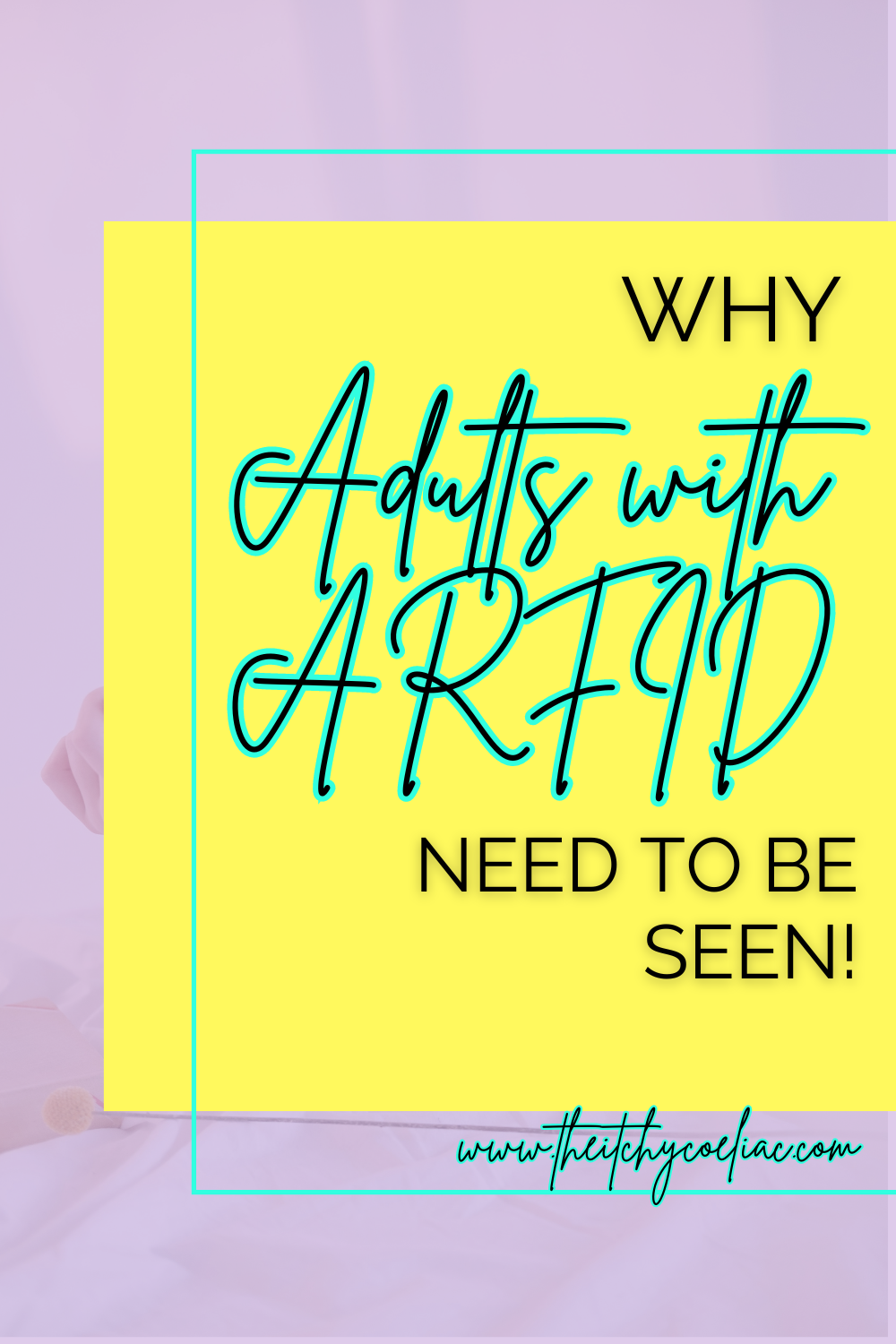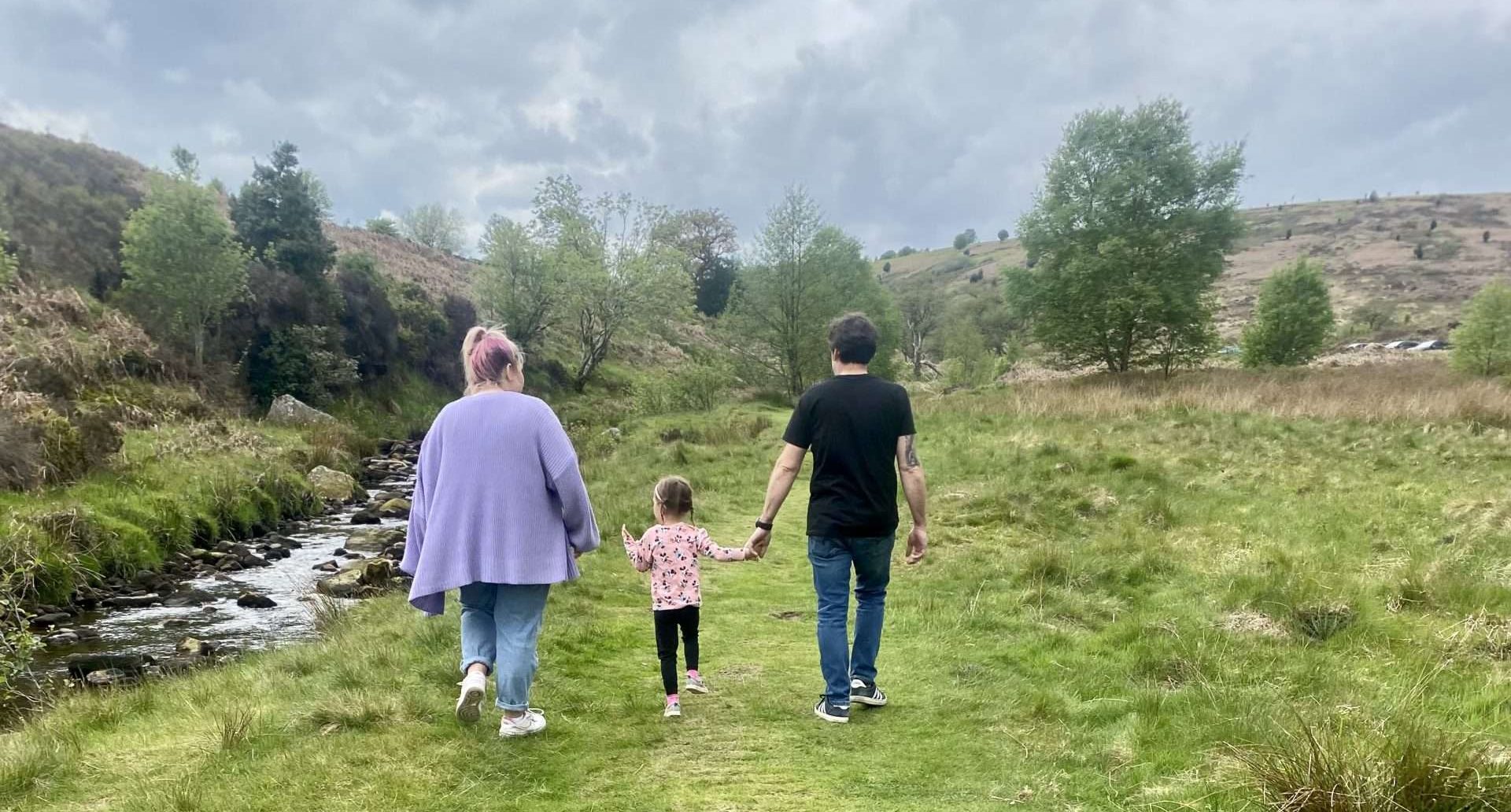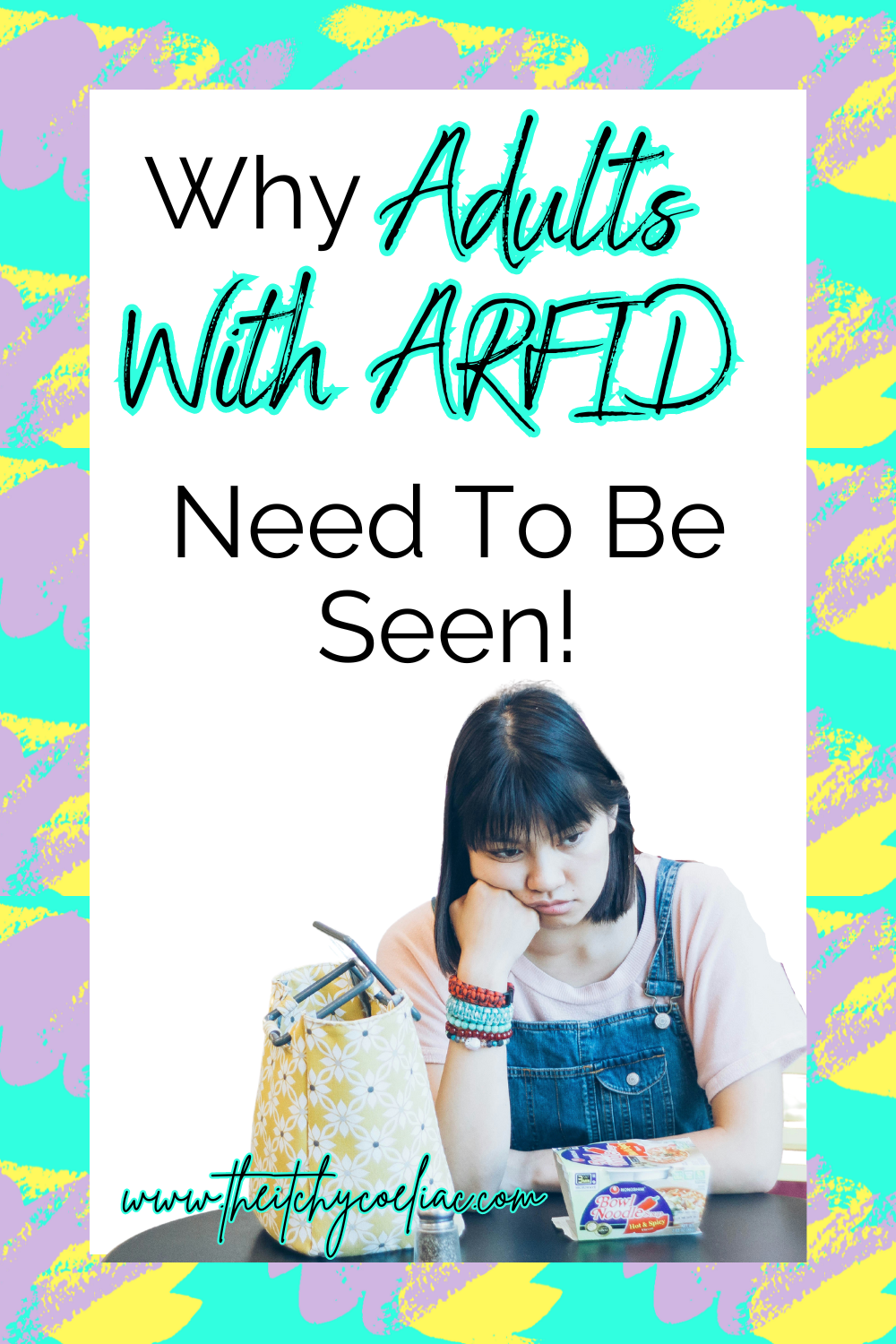Being an adult with ARFID comes with its fair share of challenges. From being judged on the food you will eat, to being chastised for the foods you won’t. The infantilisation of ARFID means there is a lack of resources for adults dealing with the disorder every day.
I’m here as a 26-year-old woman, telling you that avoidant restrictive food intake disorder is NOT just a children’s disorder. It affects so many adults too.
If you haven’t already, make sure to check out my post ‘What is ARFID? Everything You Need to Know‘ to clear up your knowledge on what avoidant restrictive food intake order is!
Why not pin it for later?

Here’s just a few of the ways that life as an adult with ARFID can be difficult. Plus some ideas for how we can break those misconceptions that this is an eating disorder that only affects children.
The stigma of being ‘a picky eater’
One of the biggest challenges us adults with ARFID must overcome is the stigma that is attached to the disorder. For the most part, ARFID is known incorrectly by many as ‘picky eating’. A common connotation of ‘picky eating’ is ‘picky child’.
Many associate picky eating with childhood and how kids can often be a bit choosier about what they want to eat. This can be for several reasons (some which are perfectly valid!) but when you have ARFID you are not simply a ‘picky eater’.
So, to imply that a grown adult who has ARFID is like a ‘picky child’, it can be totally demeaning. Not to mention, ignorant of the way we feel about eating. It suggests that we’re less than someone without an eating disorder because ‘they’re grown up and eat like an adult’. This is absolutely not the case.
This is usually stereotyped by the types of food people with ARFID tend to be happier eating. Safe foods are vitally important to someone with ARFID. They’re the food that’s essentially giving them all the nutrients and stuff they need to keep their body going. They may not always be the healthiest or the most nutritionally valuable, but the common phrase is, “fed is best.”
When someone looks at our plate of chicken nuggets or chips and offers a comment about how we eat like a child – this is not helpful. It’s incredibly rude and makes us feel like failures. It makes us wonder, why didn’t I grow up? We know that what we’re eating isn’t the norm for most people but it’s what makes us feel safe. It shouldn’t be undermined as simply being ‘kid’s food’.
This includes ordering from the kids menu! A lot of my own safe foods are things like pizza, sausages, chips and chicken nuggets. Things that are more commonly found on the kids menu of a restaurant rather than the main menu. We shouldn’t be forced to feel like children because we have an eating disorder.
That being said, if you are someone with ARFID and you’re afraid to order something you feel safe with because it’s not on the main menu – please, just order it and feel no shame in it because at least you’re eating!
Adults with ARFID can find themselves socially isolated
This does link to my previous point but being an adult with ARFID can cause problems when it comes to social relationships. For most people, the idea of going out and eating a meal is something they look forward to. This may not be the case for an adult with ARFID.
We already know that, depending on where we’re going, we may have to order a side as our main meal. Or ask for certain aspects of the meal to be changed. Usually, we don’t have an issue with this as we know it means we’ll be able to eat. But something I’ve noticed is that other people seem to have the biggest opinion on it!
If I go out to a meal with people that are unfamiliar with my eating disorder and I just order a portion of chips, I’m almost always met with phrases like: Aw, don’t you want to try something else? That won’t fill you up, get something else! You can’t just eat that, it’s not a meal!
These comments can lend themselves to making us feel like we just simply shouldn’t be eating out at all. That in turn has a direct impact on our social lives and whether we agree to go on social events.
This is something that I’ve noticed mainly with work. The people in my office often decide to go out for dinner or order something in like Nandos or Subway. There’s not really anything that I’ll eat from either of those places so when they ask if I’d like to go with them, I politely decline. It turns into a huge conversation about why I’m not eating, what’s wrong, etc.

This also then leads to a kind of social isolation with my work colleagues. While they’re out getting dinner and chatting together, I’m sitting at my desk (alone) waiting for my microwave chips to cook.
I know, I know! I could have gone with them and chosen not to eat or just got some crisps or something. But I know that it would have been met with questions and raised eyebrows and ‘can’t you just…’. It certainly wouldn’t be a relaxed dinner experience.
Social isolation and possible discrimination are something that can be super difficult to manage as an adult with ARFID. This is why more awareness and acceptance is vital so that we’re able to go out and enjoy spending time with others without having to worry about how our eating disorder might look to them.
Underestimating the severity of an adult with ARFID
A challenge that is faced by adults with ARFID that can be a bit more serious is the barriers it creates to getting treatment.
When you go online and type in ‘avoidant restrictive food intake disorder’ there are a number of articles and websites that come up. A few of them do mention ARFID in adults to some degree. For the most part they’re written with parents or carers of children in mind.
I completely understand that there are lots of kids that are struggling with ARFID and it’s important that parents/carers are informed and supported. But I can’t help but get a strange feeling from reading information like that. It almost makes me feel like I’m somewhere I shouldn’t be. I feel like a fraud in the sense that I’m claiming to have this ‘childs disorder’.
Because of this, it can be difficult to seek the help that we need. I mean, who wants to tell a doctor they have a disorder that’s mainly thought of as affecting children? It can feel embarrassing and a little humiliating.
Further to that, treatment options for adults with ARFID are extremely limited. To treat ARFID it needs a comprehensive and complex look into the causes, impacts and fears associated with each individual. ARFID can look different in every case so it’s important that when being treated it’s looked at from the individual’s perspective.
When ARFID is infantilised it can hinder efforts to seek professional help. Doctors might fail to take it seriously and think we are simply ‘going through a phase’. By underestimating the severity of an eating disorder, the physical and psychological effects will worsen over time as appropriate intervention and support is delayed.
Self perception when you have ARFID as an adult
Probably one of the most difficult challenges we face as adults with ARFID, or at least in my opinion, is how it affects our self perception. Feelings of shame, guilt and inadequacy are common in those that struggle with ARFID.
For me it stemmed from that feeling of not having grown up. I would tell myself that how could I possibly be considered an adult? I only eat the same four meals over and over again?
I’d put myself down as being a bit of a let down anytime I was offered food that I wouldn’t eat. Or anytime someone ‘forgot’ about a fear food of mine and made it for me. Or whenever I’d have to ask for a separate meal to be made so I’d have something to eat. Inconveniencing people was something that really made me feel shame about my eating disorder.
These negative feelings that come from having our eating disorder infantilised can cause a significant increase in the psychological effects of the disorder. It also furthers my earlier point about people perhaps being more reluctant to look for help.
Adults learn to live with ARFID
A lot of adults with ARFID have simply learnt to live with their disorder and the challenges that come with it. This was certainly the case for myself. Until a couple of years ago, I hadn’t even heard of avoidant restrictive food intake disorder.
When I was younger it was known as selective eating disorder and wasn’t really talked about, much less diagnosed. So apart from a small stint of therapy around the age of 10, I’d pretty much just been left to my own devices. Through this, I’d had to learn to live my life around ARFID (without even knowing that’s what it was!). Both me and my family just accepted that there were only certain foods I’d eat and that would just always be the case.
The fact that a lot of adults with ARFID either don’t have the information or don’t feel that they can look for a way to treat their eating disorder is just crazy.
We need to change the current mindset that is used when thinking about avoidant restrictive food intake disorder. Those dealing with it need to know that it’s okay to look for help or to advocate for yourself when it comes to things like social events. Regardless of what age you are!

That’s partly why I began writing about ARFID. I wanted to be part of the movement to bring awareness and understanding. Because the more people that know about it, the more we’re able to smash those misconceptions and break the stigma around it.
Are you an adult with ARFID?
If you are an adult that has ARFID, here are just a few things to try and turn these challenges into minor inconveniences.
Don’t be afraid to ask for help
An eating disorder like ARFID does not just go away all by itself. Please don’t be scared to go to your healthcare professional and ask for help. While I can’t guarantee they’ll be completely helpful, at least you’re trying.
I would also check out online resources. There are a couple of really great sites that offer a good insight to ARFID and what can be done about it. These include Beat Eating Disorders and ARFID Awareness UK.
You are valid
No matter how the wording of a treatment pamphlet makes you feel or if someone calls you ‘childish’ for eating the way you do, please don’t believe it. You and your feelings are completely valid.
Eating disorders work in crazy ways sometimes and we don’t always understand some of the things we do. But it doesn’t mean that we’ve grown up wrong or that we’re stuck in a child’s mentality.
If you are feeling any shame or guilt, just remember you didn’t ask for your eating disorder. It’s something that is out of your control.
Find your community
Something that I find I’m saying a lot on this blog is how amazing I’ve found the communities around my Eczema, Coeliac Disease and ARFID. Through simply joining Facebook groups and following people on Instagram it’s blown my mind just how many people are out there just like me.
It sounds silly because obviously there are other people with ARFID in the world but like I said, I didn’t even know what it was a few years ago. To finally find some answers to the way I ate and have that community there that knew what I was going through – it’s completely opened my eyes and I love it.
Being an adult with ARFID is definitely something that can be a challenge at times but I’m hopeful that more awareness is being made. Progress in the way of treatment is something I’m certain will happen but for the moment, definitely make use of what is out there. We just need to change the mindset slightly and accept ARFID as being an eating disorder that does affect all ages in very real ways.
If you’re an adult with ARFID, let me know in the comments! I’d love to know how you’ve found it. Have you struggled with some of the issues I’ve highlighted? Have you been able to find good age appropriate treatment?






